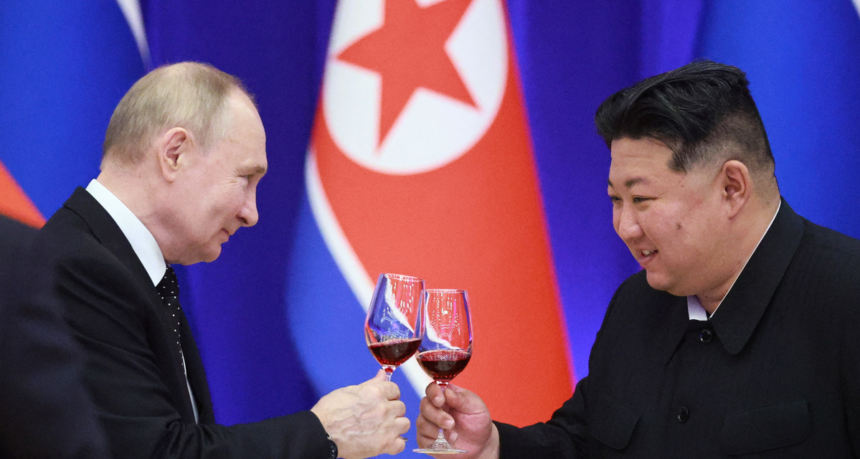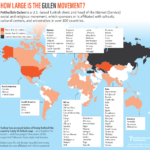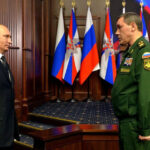Summary by Geopolist | Istanbul Center for Geopolitics:
This study presents a comprehensive examination of North Korea’s decision to strengthen its ties with Russia amid the Ukraine conflict, examining the extensive operational and strategic ramifications for Northeast Asia and the Korean Peninsula.
1. North Korean Troop Deployment in Russia
Nature and Scale of Deployment: North Korea has dispatched approximately 12,000 troops, including special operations forces, to Russia’s Kursk Oblast. Initial reports confirm a mix of infantry and specialized units, including about 1,500 special forces personnel, who underwent training in Russia’s Far East before being sent to Kursk.
Operation Role: The North Korean forces are anticipated to bolster Russian defensive lines in Kursk, assisting Russia in managing a newly established front due to Ukrainian advances. This deployment enables Russia to circumvent additional mobilization of its citizens, so averting the social and political repercussions associated with conscription, which has been divisive domestically.
Combat Experience and Tactical Learning: North Korea’s military has possessed minimal experience in contemporary fighting since the Korean War, depending on antiquated doctrines that are ill-suited for advanced warfare. North Korean troops are participating in the conflict in Ukraine to acquire current combat methods and familiarize themselves with technologies such as drones, electronic warfare (EW), and GPS jamming, which are essential in high-intensity engagements against technologically superior adversaries. North Korea perceives this as a singular opportunity to enhance its combat preparedness and military doctrine, particularly in relation to Western-equipped soldiers.
2. Geopolitical Strategy and Diminished Reliance on China
An Examination of Alliance Dynamics: Traditionally, China has served as North Korea’s primary ally, offering both economic and military assistance. North Korea’s growing dependence on Russia indicates Pyongyang’s strategic aim to diminish China’s influence over its policies, particularly in areas where China has frequently played a limiting role.
Diversification of Support: The partnership with Russia presents North Korea with a potential alternative for acquiring advanced military technology and economic assistance, which may encompass direct financial contributions and fuel supplies. The implementation of this new support system has the potential to diminish North Korea’s reliance on China, given that Russia is presently more inclined to disregard international sanctions, a consequence of its own pariah status stemming from the invasion of Ukraine.
Consequences for Regional Stability: The increasing independence and assertiveness of North Korea, supported by Russia, presents potential threats to the stability of the region. China frequently limits North Korean aggression to maintain regional stability; conversely, Russia might promote North Korea’s assertiveness as a strategy to counter U.S. influence in the Asia-Pacific. This shift increases the probability of North Korea engaging in more frequent or intensified provocations, such as missile tests and aggressive manoeuvres directed at South Korea.
3. Influence on North Korea’s Nuclear and Missile Initiatives
Indirect Boost to Nuclear Development: Although Russia has not overtly pledged backing for North Korea’s nuclear initiative, the alignment augments Pyongyang’s access to financial resources and potentially dual-use technologies that could indirectly advance its nuclear objectives. Enhanced commercial and economic collaboration, together with access to Russian satellite and scientific expertise, could facilitate North Korea’s progression in missile and nuclear capabilities.
End of Sanction Monitoring:: Russia’s veto regarding the United Nations Security Council’s sanctions compliance monitoring for North Korea in 2024 has significantly undermined the international sanctions framework, granting North Korea increased latitude to advance its nuclear objectives. The memo indicates that Russia’s revised position may facilitate more direct cooperation on nuclear or missile technologies, as Russia is less constrained by the necessity to comply with Western-imposed sanctions.
4. Mutual Defence Treaty and Regional Security Threats
Russia-North Korea Defense Agreement: The 2024 mutual defence pact between Russia and North Korea legally obligates both nations to provide assistance in the event of outside assault. The unclear language in the deal may enable Russia to refrain from assisting North Korea in wars instigated by Pyongyang; nevertheless, it simultaneously provides North Korea with a more robust security guarantee, thus encouraging a more aggressive posture.
Possible Scenarios in Northeast Asia: North Korea may seek to exploit this deal to obtain Russian backing or, at a minimum, deterrence against U.S. or South Korean intervention in the event of heightened tensions on the Korean Peninsula. This may result in further military posturing by North Korea, heightening tensions and the likelihood of conflict in the region.
Increased Credibility of North Korean Threats: North Korea’s threats toward South Korea have increased credibility with Russia as a new friend. South Korea, accustomed to China’s relatively cautious approach toward regional security, now faces the uncertainty of Russia’s involvement, a country that has shown more willingness to engage in direct conflict. This new dynamic may shift South Korea’s approach to its own defense policies and alliances, likely increasing its defense spending and reliance on the United States for deterrence
5. Consequences for the Korean Peninsula and the U.S.-South Korea Alliance
North Korea’s Renewed Hostility Toward South Korea: Recently, North Korea has intensified its rhetoric towards South Korea, amending its constitution to designate South Korea as its primary adversary and declaring the cessation of peaceful reunification initiatives. The animosity, coupled with the alliance between Russia and North Korea, indicates a novel stage of intensified tensions on the peninsula.
Operational Interoperability with Russian Forces: Through the process of training and engaging in combat alongside Russian forces, North Korea seeks to improve its military compatibility with Russia, a strategy that may be utilized in potential future conflicts on the Korean Peninsula. This may influence South Korea’s security assessments and add complexity to the strategic responses of the U.S.-South Korea alliance.
Possible Responses from the U.S. and the Region: The United States and its allies, especially Japan and South Korea, may need to modify their regional strategy due to North Korea’s improved capabilities and its fortified security alliance with Russia. This may result in enhanced military collaboration among U.S. partners in Asia, augmented joint training exercises, and increased investment in missile defence systems.
6. Long-Term Strategic and Tactical Considerations
Learning and Absorbing Modern Warfare Tactics: The experience acquired by North Korean forces in Ukraine may influence North Korea’s future military policy, especially on joint infantry and special operations, drone utilization in combat, and electronic warfare techniques. Exposure to contemporary battlefield conditions, particularly in a high-tech, drone-saturated conflict zone, will undoubtedly affect North Korea’s organization of its forces and the evolution of its combat strategy against South Korea and possibly other opponents.
Challenges in Command Integration: The document highlights cultural and linguistic hurdles between Russian and North Korean soldiers, which may impede North Korea’s capacity to assimilate lessons acquired successfully. There are possibilities that North Korean forces may be assigned to high-casualty frontal assault positions, thereby constraining the strategic advantages Pyongyang seeks from the deployment.
In sum, North Korea’s involvement in Russia’s war in Ukraine is part of a broader strategy to modernize its military, reduce dependence on China, and increase its regional influence. This new alliance with Russia, though fraught with potential pitfalls, could embolden North Korea to pursue more aggressive actions on the Korean Peninsula and may necessitate recalibrated responses from the U.S., South Korea, and Japan to maintain regional stability.
Read more below.







